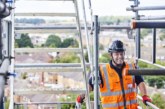
Moving to net zero will bring fundamental changes to our homes, with new technologies creating a web of interconnected challenges and risks — made more problematic by having the oldest housing stock in Europe. Yet in our increasingly electric world, electrical safety is still not given the attention it deserves. Now a new report by campaigning charity, Electrical Safety First, offers a 360-degree look at the issue.
Future Homes – Electrical Safety in the Net Zero Home, considers some of the key technologies of the home of the future and their associated risks, as well as recommendations to enhance electrical safety. The report offers an integrated approach to the future home, reviewing four key themes: housing infrastructure, electric vehicles, product safety, and growing the installer base.
“Transitioning to net zero is of critical importance but we need to ensure it is not at the cost of consumer safety”, explained Lesley Rudd, Chief Executive of Electrical Safety First. “We believe that by addressing these key, interrelated issues now, will help ensure the future home is not only low carbon and smart, but also safer.
“From 2025, all new homes must be future-proofed with low carbon heating. A net zero home is also likely to be highly insulated and may include onsite renewable electricity generation and smart technologies, as well as electric vehicle home-charging points. So electricity — now increasingly produced from renewable sources — is set to play a key role in new-builds. However, retrofitting existing homes will be a greater challenge. The UK has the oldest housing stock in Europe and deploying such new technologies introduces inherent safety risks, particularly since we are in the midst of a major skills shortage”.
To gain feedback on the report — to inform further research and campaigns — the Charity has established a series of roundtables. The first event, on housing infrastructure, took place recently, with representatives from housing associations, consumer protection organisations, fire and rescue services, and relevant professional bodies. Discussions focused on the report’s recommendations for improving data gathering for effective policy planning and the need for interventions and safeguards, such as mandatory electrical checks and support for vulnerable consumers.
The full report plus summary briefings can be downloaded here.








